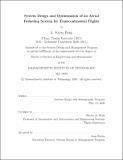| dc.contributor.author | Rong, Keran. | en_US |
| dc.contributor.other | Massachusetts Institute of Technology. Engineering and Management Program. | en_US |
| dc.contributor.other | System Design and Management Program. | en_US |
| dc.date.accessioned | 2021-10-08T16:59:42Z | |
| dc.date.available | 2021-10-08T16:59:42Z | |
| dc.date.copyright | 2020 | en_US |
| dc.date.issued | 2020 | en_US |
| dc.identifier.uri | https://hdl.handle.net/1721.1/132863 | |
| dc.description | Thesis: S.M. in Engineering and Management, Massachusetts Institute of Technology, System Design and Management Program, May, 2020 | en_US |
| dc.description | Cataloged from the official version of thesis. | en_US |
| dc.description | Includes bibliographical references (pages 145-149). | en_US |
| dc.description.abstract | Currently, intercontinental flights are long-haul flights, and commercial aircraft are not refueled during the flight. As a result, the fuel consumption of intercontinental flights increases exponentially with the distance travelled, because these long-haul flights consume extra fuel due to their weight gain. Intercontinental aviation already accounts for a significant portion of global carbon emissions and this is expected to grow rapidly in the foreseeable future. Therefore, aircraft emissions from transcontinental flights have become a global challenge both socially and technologically. In this study, we propose a floating air refueling system (FARS) to reduce fuel costs on intercontinental flights. In this system, we launch a tanker to refuel incoming intercontinental aircraft. Through the refueling process, intercontinental flights avoid the exponential fuel consumption caused by the additional fuel required, and can potentially reduce aircraft emissions. This thesis presents the design of a floating aerial refueling system, including stakeholder analysis, system architecture design and economic feasibility analysis. In addition, we propose a method for mathematical simulation and optimization of FARS using different techniques. Finally we analyze FARS's feasibility and sensitivity based on case studies. The case study of Singapore Airlines SQ21 shows that our optimized design can save up to 39,415 tons of jet fuel annually over a 25-year life cycle, with a net present value of USD 266 million. | en_US |
| dc.description.statementofresponsibility | by Ir. Keran Rong. | en_US |
| dc.format.extent | 149 pages | en_US |
| dc.language.iso | eng | en_US |
| dc.publisher | Massachusetts Institute of Technology | en_US |
| dc.rights | MIT theses may be protected by copyright. Please reuse MIT thesis content according to the MIT Libraries Permissions Policy, which is available through the URL provided. | en_US |
| dc.rights.uri | http://dspace.mit.edu/handle/1721.1/7582 | en_US |
| dc.subject | Engineering and Management Program. | en_US |
| dc.subject | System Design and Management Program. | en_US |
| dc.title | System design and optimization of an aerial refueling system for transcontinental flights | en_US |
| dc.type | Thesis | en_US |
| dc.description.degree | S.M. in Engineering and Management | en_US |
| dc.contributor.department | Massachusetts Institute of Technology. Engineering and Management Program | en_US |
| dc.identifier.oclc | 1263346802 | en_US |
| dc.description.collection | S.M.inEngineeringandManagement Massachusetts Institute of Technology, System Design and Management Program | en_US |
| dspace.imported | 2021-10-08T16:59:42Z | en_US |
| mit.thesis.degree | Master | en_US |
| mit.thesis.department | SysDes | en_US |
